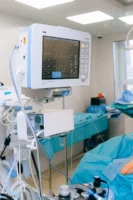
16 Feb McMaster Study Finds Musical Alarms Can Decrease Stress For Hospital Workers
MedicalResearch.com Interview with:

Dr. Schutz
Michael R. Schutz, Ph.D.
Professor of Music Cognition/Percussion at McMaster University
Founding director of the MAPLE Lab and
Core member of the McMaster Institute for Music and the Mind.
Prof. Schutz is also a professional musician and directs McMaster’s percussion ensemble.
MedicalResearch.com: What is the background for this study?
Response: Hospitals around the world are filled with devices generating aconstant stream of tones conveying information to medical staff.overburdened healthcare professionals, and contributes to burnout inmedical staff. The Emergency Care Research Institute (ECRI) regularlyincludes problems with auditory alarms in their list of “Top 10 HealthTechnology Hazards” and they are so problematic an FDA surveyimplicated them in hundreds of patient deaths.While there is currently a lot of interest in how to improve alarmmanagement protocols, this study is different in that it looks atimproving the quality of the alarm sounds themselves. For historicalreasons many default to simplistic “beeps” which are generallyannoying. While annoying is useful for critical alarms requiringimmediate action, the vast majority of these messages are merelyintended to update medical staff of changes (i.e. blood pressure isrising) or indicate other situations that do not require immediateaction. Unfortunately, many machines use the same simplistic andannoying “beeps” regardless of whether the messages are urgent ornon-urgent. This constant flood of annoying beeps negatively affectsboth patients (extending recovery time due to interrupted rest) andstaff (who can develop “alarm fatigue” from the constant cacophony).MedicalResearch.com: What are the main findings?
 Response: Here we show that changes to the structure of the tones used in these
Response: Here we show that changes to the structure of the tones used in these
machines can dramatically reduce their annoyance, increase theirdetection, and preserve concurrent speech comprehension. And becausethese changes do not require changing the pitches or timings of thesounds, they would not require significant additional training to use.Doctors and nurses who recognize current alarms could recognize thenew sounds immediately. They would just be less annoying and easierto hear.
MedicalResearch.com: What should readers take away from your report?
Response: One retired nurse referred to her hospital as a “beeping hellscape”due to the alarms-a term which aptly describes the working conditionsfor many overburdened healthcare professionals. Here we show thatimproving the sounds used in alerting devices (independent of theirfrequency or the specific sequences used) can reduce their annoyanceand increase their detection while preserving the ability of medicalstaff to communicate. Because these changes are to specific tones(rather than the sequences of sounds) they are backwards compatible –meaning that staff who know the current alarms could recognize themessages encoded in the new ones quite easily. They would just be farless annoying for patients and staff alike.
MedicalResearch.com: What recommendations do you have for future research as a results of this study?
Response: Many current alarm sounds were adopted without testing orconsideration of basic principles of auditory perception.Consequently we have created significant unnecessary stress andproblems in healthcare that could be avoided by simply using bettersounds. Music serves as an ideal vehicle for new ideas on betteralarm design. Artistic considerations aside, music offers a wonderful“playground” for non-verbal auditory communication. So acousticprinciples that are true in music are likely true in the design ofalarms as well. And one thing we see in instruments all the worldover is that they make rich, complex sounds. Essentially the oppositeof the simplistic beeps used in so many medical devices.
MedicalResearch.com: Is there anything else you would like to add?
Response: For more information and background leading to this study please seemy TEDx Talk “Death by Beep?” at www.maplelab.net/ted
Citation:
Foley L, Schlesinger JJ, Schutz M. Improving detectability of auditory interfaces for medical alarms through temporal variation in amplitude envelope. Br J Anaesth. 2023 Jan 17:S0007-0912(22)00648-1. doi: 10.1016/j.bja.2022.10.045. Epub ahead of print. PMID: 36658020.
https://pubmed.ncbi.nlm.nih.gov/36658020/
The information on MedicalResearch.com is provided for educational purposes only, and is in no way intended to diagnose, cure, or treat any medical or other condition. Always seek the advice of your physician or other qualified health and ask your doctor any questions you may have regarding a medical condition. In addition to all other limitations and disclaimers in this agreement, service provider and its third party providers disclaim any liability or loss in connection with the content provided on this website.
